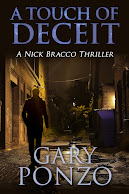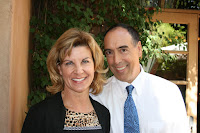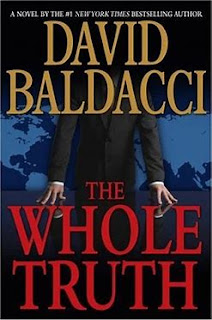1- Congrats on your rags to riches story. When you participated in 5 Questions back in 2012, you were just getting the news that your book, Wool, had made # 13 on the NY Times bestseller list and you were over the moon about that accomplishment. Thirteen years later, your series, Silo, based on your trilogy starting with Wool is one of the most watched shows on Apple TV. Which satellite are you jumping over now?
My professional career has been waking up from one dream only to find myself in an even better one. Pinching myself just seems to accelerate it! In most creative endeavors, luck plays a much more important role than we realize. Yes, you have to work hard. But so are many others, and not everyone has the same outcome. You really have to get lucky and be full of gratitude.
I like to think of this process as walking along a ridgeline
and feeling like every step puts you on the peak. You’ll probably start
declining any day now. Look around and appreciate the view, because it could be
your last. I’m grateful for the first readers who gave my book a chance, and
every bit of fortune that’s followed. Because all I’ve ever done is sit down
and write the stories I wish already existed, because they entertained me. Then
let everything else sort itself out.
But now to answer your question honestly, because none of
the professional goals are what have me leaping over the moon. Three years ago
next month, I met the love of my life. We’ve been on an epic adventure ever
since, seeing how deep the love between two people can truly go. We are about
to move onto a boat together to sail around the world while I work on my next
novels, and that’s what’s got me leaping over the moon. Literally. Our boat is
named “Luna.”
2- Back in 2012 you were adamant about maintaining your e-book rights. This was when e-books were in their infancy. You were a self-published phenomenon and brought so much to the table for the publishers to acquire. How do you feel you navigated that landscape?
Every move I made back then, all I heard from industry
experts was that I was making a mistake. Turns out, none of us knew what was
going on, and listening to my gut paid huge dividends. Keeping my e-book,
audio, and foreign rights ended up making me far more than I could have in any
traditional book deal. But what’s even crazier is that my agent and I
negotiated for all my book deals to expire on a set date, so I get every right
back even after I sign a deal. Most of these deals, even with major US publishers,
only last three to five years. I’ve sold the rights to the SILO series four
times now. Each deal has been for a larger amount than the one before. That
means over a decade after writing WOOL, I did a huge 7-figure deal that expires
after a set amount of time.
These are unprecedented deals, and none of them would be
possible without the best agent in the business, Kristin Nelson. Early on as
WOOL was hitting bestseller lists, I heard from dozens of agents who wanted 15%
of what I was making. And then I got an email from Kristin, who started off by
congratulating me on my success, letting me know she first heard about my books
because a colleague in her office was reading them on the Kindle and raving,
and then said I probably didn’t need an agent, but that she could get me deals
overseas and in Hollywood. She said I should keep self-publishing, keep that
15%, but use the success of the books as leverage to ask for impossible deals
from publishers, making inroads for other authors.
It worked out just as she hoped. I think we recently did our
45th deal in a foreign country, one she’s never sold rights into for
any other client! And she’s helped me get numerous Hollywood deals, including
two shows made (SILO and BEACON 23). Kristin and I are family now. Quite a few
years ago, I sent her an email letting her know I’d like to start paying her
15% for my self-published sales as well. She never asked for that cut of the
proceeds, but she very much earned it.
3- Your writing is so stream of consciousness, it’s so easy to get mesmerized into the story and lose track of time. When I read Wool all those years ago, I imagined the universe you created in my mind, which lent itself to a visual medium. Which writers inspired you to start this extraordinary journey?
I’m a reader, first and foremost. There’s nothing better
than getting sucked into a great book and forgetting the world exists. You see
what the page is describing. You hear the characters in their unique voices.
The drama and tension become visceral. When I started writing, I wanted to
capture that same feeling of immersion, so I started paying attention to the
books that made me feel fully present in the make-believe.
Dozens of my favorite authors are fantastic at this, but a
few that I highly recommend studying are David Mitchell, Zadie Smith, Colum
McCann, and N.K. Jemisin. But I also try to balance breezy immersive prose with
clear storytelling and solid plot. For that, look to the likes of Harlan Coben,
Mary Higgins Clark, and John Green. All three have great prose, but they know
how to tell stories that thrill wide audiences.
And I dip back into the classics all the time. John D.
MacDonald’s Travis McGee books, the Fletch books, anything by Twain or Margaret
Atwood. Comfortable, familiar reads that you go over many times over the
decades. Each one is like ringing a tuning fork.
4- Graham Yost is an acclaimed showrunner who, among many other things, including Silo, produced Justified for FX which is one of the best adaptations of an Elmore Leonard story I’ve ever seen. You are also a producer on Silo, so tell us how much input you have on the production and what is the dynamic between you two?
I’m very lucky to consider Graham a friend. We get along
great and have from day one. We have similar tastes in story and character, and
we both like to have fun while doing our best work. Graham really lifts up
everyone around him, making sure anyone on his team gets a chance to outgrow
his mentorship. You don’t see that enough in any profession, much less
Hollywood.
My involvement as an executive producer is mostly to stay
out of the way. I give notes on scripts, and I’ve seen places where it made the
show better as a result. But that’s what everyone in the writer’s room and
every producer is doing. Many hands make light work. A highlight for me was
being in the first writer’s room as we broke out the seasons and the pilot and
unlocked how to adapt these books for the screen. I’ve been working solo for
many years. Getting a chance to be creative with a team was immensely
rewarding.
5- Your dream back in 2012 was to write for the rest of your life without a day job. Mission accomplished. Now with Beacon 23, an MGM+ TV show based on your short stories, and the many other projects you have working, what does the future look like for you and your lovely wife, Shay.
The future includes a lot of sailing from place to place while I work on the next projects! We move onto a catamaran in July and start getting it ready to sail across the Atlantic and then the Pacific. I did a similar trip ten years ago, but this time I won’t be sailing alone.
I’m working on the third and final SAND book right now, and
that series is in pre-production for a TV series (these things rarely go all
the way, but it’s fun to be noodling forward with a great team). I started a
short story last week that I can’t stop thinking about. And I get to keep
finding new great reads to whisk me away to someplace fantastical.


















